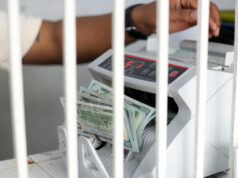South China Sea energy deal must be with Chinese firm — PHL
ANY POTENTIAL DEALS between Manila and Beijing on energy exploration in the South China Sea should be agreed with a company and not the Chinese government, a senior Philippine official said on Thursday.
China claims most of the South China Sea, a key trade route and home to areas that are believed to hold large quantities of oil and natural gas. Along with China, parts of the South China Sea are subject to competing claims from Brunei, Malaysia, Taiwan, Vietnam and the Philippines.
“We might enter into an agreement with a Chinese-owned corporation, not the Chinese state itself,” Herminio Harry L. Roque, Jr., the spokesman for President Rodrigo R. Duterte, told ANC news channel.
The two countries last month agreed to set up a special panel to work out how they can jointly explore offshore oil and gas in areas both sides claim, without needing to address the touchy issue of sovereignty.
Pursuing a joint project would be extremely complex and sensitive, as sharing oil and gas reserves could be seen as endorsing the other countries’ claims.
“We are not entering into a sovereign agreement for exploration. It will be an agreement, if we do, between two corporate entities,” Mr. Roque said.
Mr. Duterte said late Wednesday that China had proposed joint exploration that was “like co-ownership” and better than the two fighting over it.
Mr. Roque on Thursday stressed during a news briefing that the issue was about joint exploration and exploitation as a practical solution for the Philippines to access resources without conflicts over sovereignty.
He said Mr. Duterte was using co-ownership as an analogy to try to simplify the issue.
“The President just wanted to explain that joint exploration and exploitation will be undertaken by both Philippine and Chinese nationals. Now having said that, you know, ownership is not material here because…the areas that may be subjected to joint development is EEZ (Exclusive Economic Zone), where we only exercise sovereign rights. So let’s not talk about ownership, because a sovereign right is different from title,” Mr. Roque said.
Yet he also said: “Ngayon, offer nila joint exploration ’di parang co-ownership. Parang dalawa tayong may-ari niyan. Eh ’di mas maganda ’yan kaysa away,” Mr. Duterte said. (Now, China offers to have a joint exploration, and that sounds like ‘co-ownership.’ It’s like both of us (China and the Philippines) own it. That is better than having a dispute with them.)
Mr. Roque likewise expressed confidence that China will give the Philippines its “fair share” once the two countries embark on joint exploitation in the disputed waters.
“I think so, and as to the applicable law, because this will be pursuant to an agreement between two nations. It will be governed by international law,” he said.
The spokesman clarified as well that the country’s joint ventures with China does not require the Philippine government to recognize the latter’s claim of sovereignty over the disputed area.
“Certainly not. Joint exploration is exactly what it is. It’s a practical solution for the Filipinos to utilize natural resources without having to deal with the contentious conflicting claims to territories,” he said.
In a social-media post, former solicitor-general Florin T. Hilbay said Mr. Duterte’s remarks on Wednesday are “a clear example of impeachable offenses involving culpable violation of the Constitution and betrayal of public trust.”
“The West Philippine Sea is exclusively ours under the Constitution and the decision in Philippines v. China, he’s giving it away,” Mr. Hilbay added.
When asked to comment, Mr. Roque said Mr. Duterte’s latest remarks on the maritime dispute is “not” an act of betrayal of public trust, adding Mr. Hilbay “is free to file an impeachment complaint if he wants.”
The Philippines suspended exploration in the Reed Bank in 2014 to pursue a legal challenge to China’s territorial claims.
Included in a 2016 ruling by the Permanent Court of Arbitration in the Hague was a clarification of Manila’s sovereign right to access offshore oil and gas fields, including the Reed Bank, within its 200 mile Exclusive Economic Zone.
Negotiations are ongoing with a Chinese state-owned company, Mr. Roque said, declining to name the entity.
The Philippines, China’s CNOOC Ltd., and state-owned PetroVietnam jointly surveyed the Reed Bank in 2003 to 2008.
Mr. Roque said, however, there were some doubts that a joint agreement would work because China did not favor joint activities.
The Philippines’ ties with China have warmed under Mr. Duterte, who has put aside territorial disputes in exchange for trade opportunities and pledged financing for infrastructure projects. — Reuters with Arjay L. Balinbin



